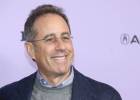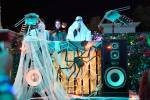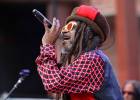The Writing Process
Bill Cosby went to Temple University in 1960 on the strength of a measly SAT exam score of 500.
"I was the happiest person ever," The Coz says.
He was 22 or 23.
"I had a new life, a new chance ahead of me."
He wanted to be a teacher.
He wanted, he says, "to get the word out to boys and girls not to waste their life, stopping in the middle of the road to party."
Anyway, so there he was at Temple.
"They put me in remedial everything. And I loved it! I loved it! I studied. And I loved it. And I wrote. And I challenged myself in writing English compositions."
He challenged himself to write about subjects differently than everyone else did.
"The biggest surprise with me was to see the professor holding my paper and telling the class, 'This is a professor's dream.' And he read my paper.
"But here's the punch line. When he handed it back to me, I had a B+ and a whole lot of stuff on the margins!"
So he had more work to do, and he did it.
The Coz went on, of course, to become one of the most successful comedians of all time -- working tirelessly to write and perform routines that brought a different take to topics.
"I have been a writer of my own material for 48 years. And I've always had a feeling that I am more important than the piece I wrote."
As a result, he was and is sensitive to criticism, as a good student would be. He listens to criticism instead of dismissing it out of hand -- which protects his qualities as a comedian.
For instance, one of his early hits in the 1960s centered around a chat between Noah and God. He performed it for three years.
"Then I read a review, and it was in Toronto, and the writer wrote, 'How many times is he gonna come up here and do the Noah piece?' And I said, 'He's absolutely correct. I've got to change.' "
Then Cosby's Fat Albert routine became a hit (presaging the "Fat Albert" TV cartoon).
"Then came a time when I said goodbye to Albert," Coz says.
"I was constantly pressing myself -- coming up with an idea and a thought. And I exercised that like someone doing push-ups."
Here's his writing process:
"I close my eyes, and I look. And I'll see something, and I'll say to myself, 'Make that funny.' "
He ponders thoughts that are prime in his mind, and he thinks about where he wants those thoughts to turn next.
He will think about five or six different things, then keep saying them over and over out loud, "until it's almost like I'm in a hypnotic state."
"That's when I start to write."
When he's finished hypnotizing himself, he'll look at what he's written.
"Sometimes, it makes no sense. But when it does make sense ... I'll take it from there."
The greatest part of his process, he says, is when "the feeling is there."
"I don't push things that I don't feel."
Next, onstage, his approach is nothing more than the ancient art form: "I am a storyteller."
"I have to juggle the audience's verbal reaction to me and the feel of the room.
"I have to listen carefully, because while I'm doing my story, it's very, very important for me to know where they're grasping and what they're enjoying.
"This thing is up to me.
"I can go up on the high wire, ladies and gentlemen, working without a net, and I better keep my balance. I better keep my wits about me."
Stand-up isn't just a matter of success or bombing, he says. When done properly, there are all kinds of comedy approaches.
"I saw Richard Pryor go out and (observe) something that felt like people were gonna start to run him out of town.
"And then, somewhere, Richard made a switch. And the people were going crazy, laughing. But in the meantime, it could have been as much as 20 minutes. And it didn't sound like a routine that he had written."
Unlike Pryor, there are comedians who get so caught up in the routine of their routines, their acts are just recitations that don't gauge audience reactions well, and "you can tell time by their acts," Cosby says.
And there are bad comedians who squander their brain power. The thought of them irritates Cosby, the man who scored 500 on his SATs and strived to the top.
"So many of these comics -- they've gone so much further, than I had, in their schooling," Cosby harrumphs.
"If they can't call up anything deep," he says, "they really should be ashamed of themselves, with the wealth that they have of the experience of an education."
Doug Elfman's column appears Sundays, Mondays, Tuesdays and Fridays. E-mail him at delfman@reviewjournal.com. He blogs at reviewjournal.com/elfman.
Preview
Bill Cosby
7 p.m. today
Treasure Island Theatre, 3300 Las Vegas Blvd. South
$69.90-$91.90 (894-7722)




























